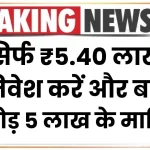
Starting April 1, 2025, taxpayers in India can look forward to bigger savings on interest income thanks to the new TDS (Tax Deducted at Source) rules. Whether you are a senior citizen earning interest on Fixed Deposits (FDs) or a salaried professional relying on interest income, these changes could make a significant difference in your annual earnings. Here’s everything you need to know about the latest update and how to benefit from it.
TDS Savings New Rule 2025
| Key Details | Information |
|---|---|
| Effective Date | April 1, 2025 |
| TDS Limit for Senior Citizens | Increased from ₹50,000 to ₹1,00,000 annually |
| TDS Limit for General Taxpayers | Increased from ₹40,000 to ₹50,000 annually |
| Applicable On | Interest income from FDs, RDs, and similar deposits |
| Forms to Submit for TDS Exemption | Form 15H (Senior Citizens), Form 15G (General Citizens) |
The revised TDS savings rule effective from April 1, 2025, is a welcome relief, especially for senior citizens and small depositors. By raising the TDS exemption thresholds, the government aims to enhance savings, ease compliance, and reduce refund processing hassles. However, it remains essential to monitor your total income, submit appropriate forms, and ensure PAN details are up to date.
What Are the New TDS Savings Rules from April 1, 2025?
The Indian government has announced a revision in the TDS threshold limits on interest income for both senior citizens and general taxpayers. These changes are designed to reduce the tax burden, improve cash flow, and make compliance smoother for individuals.
- For senior citizens, the TDS exemption limit has been doubled from ₹50,000 to ₹1,00,000 annually.
- For non-senior citizens, the limit has been raised from ₹40,000 to ₹50,000 annually.
These updates apply to interest income from Fixed Deposits (FDs), Recurring Deposits (RDs), and other similar interest-bearing financial products.
see also: These 3 Special FD Schemes of SBI Will End in Just a Few Days
Why Has the Government Revised the TDS Limits?
The primary objective behind increasing the TDS threshold is to ease the tax burden on middle-income individuals and senior citizens. In recent years, rising interest rates on fixed deposits and other savings schemes have led to higher interest earnings. However, this also triggered higher TDS deductions, leaving many small investors with reduced liquidity.
By raising the TDS limits, the government aims to:
- Encourage savings and investments.
- Reduce the number of taxpayers needing to claim TDS refunds.
- Simplify tax compliance and reduce paperwork.
This step is especially beneficial for retired senior citizens, who often rely heavily on interest income to manage their living expenses.
How Does This Benefit You? | Detailed Example
Let’s understand how the new rule works with a practical example:
Example 1: Senior Citizen
- Mr. Sharma, aged 65, has total fixed deposits generating ₹75,000 in interest income annually.
- Previous Rule: Banks would not deduct TDS as it was below ₹50,000.
- New Rule: Now, even if his interest income increases up to ₹1,00,000, no TDS will be deducted.
This results in higher liquidity and fewer hassles of claiming tax refunds.
Example 2: General Citizen
- Ms. Priya, aged 35, earns ₹45,000 annually as interest income.
- Previous Rule: TDS applied for interest income exceeding ₹40,000.
- New Rule: Now, she can earn up to ₹50,000 interest income without TDS.
This extra ₹5,000 buffer gives her more disposable income and eases tax filings.
How to Ensure TDS Is Not Deducted: Step-by-Step Guide
To benefit fully from the new TDS savings rule, you must ensure proper documentation with your bank. Here’s how:
Step 1: Check Your Annual Interest Income
- Calculate your cumulative interest earnings from all fixed deposits, recurring deposits, and other savings schemes.
Step 2: Submit Relevant Declaration Forms
- Senior Citizens (Age 60+): Submit Form 15H to your bank declaring that your total income is below the taxable limit.
- General Taxpayers: Submit Form 15G for the same purpose.
These forms are typically available both online via net banking portals and offline at bank branches.
Step 3: Keep PAN Updated
- Make sure your PAN (Permanent Account Number) is correctly linked with your bank account. Without PAN, banks will deduct TDS at a higher rate (20%).
Step 4: Monitor Income Yearly
- Review your income every financial year and re-submit Forms 15G/15H if eligible, to continue enjoying the TDS exemption.
Expert Insights: Why This Change Matters
According to tax expert CA Ramesh Gupta, “The government’s move to increase the TDS threshold is a much-needed relief for small savers, especially senior citizens who depend on fixed-income instruments. It not only reduces unnecessary refunds but also simplifies compliance for taxpayers.”
Additionally, financial advisors suggest that investors should carefully evaluate whether their total taxable income exceeds the basic exemption limit, even if TDS is not deducted. Filing an income tax return accurately is still mandatory if total income is taxable.
see also: Special FD Scheme of Government Bank Get 7.75% Interest
Pros and Cons of the New TDS Rule
| Pros | Cons |
|---|---|
| Higher TDS exemption limits improve liquidity | Tax liability may still arise at year-end based on total income |
| Fewer cases of filing TDS refund claims | Requires proactive monitoring and submission of forms annually |
| Simplifies tax compliance, especially for seniors | Some banks may not automatically apply the new limits immediately |
| Encourages savings in fixed deposits and schemes | Neglecting to update PAN may lead to higher TDS deductions |
TDS Savings FAQs
1. What is the new TDS limit on interest income for senior citizens in 2025?
From April 1, 2025, the TDS limit on interest income for senior citizens is ₹1,00,000 per annum.
2. What is the TDS exemption limit for general citizens?
For non-senior citizens, the TDS exemption limit is now ₹50,000 annually.
3. What forms should I submit to avoid TDS deduction?
Senior citizens need to submit Form 15H, while general citizens should submit Form 15G.
4. Is PAN mandatory to avail TDS exemption benefits?
Yes, it is crucial to update your PAN with the bank. Failure to do so leads to TDS deduction at a higher rate.
5. Will I still need to file income tax returns if no TDS is deducted?
Yes, you are required to file an ITR (Income Tax Return) if your total income exceeds the basic exemption limit, even if no TDS is deducted.











